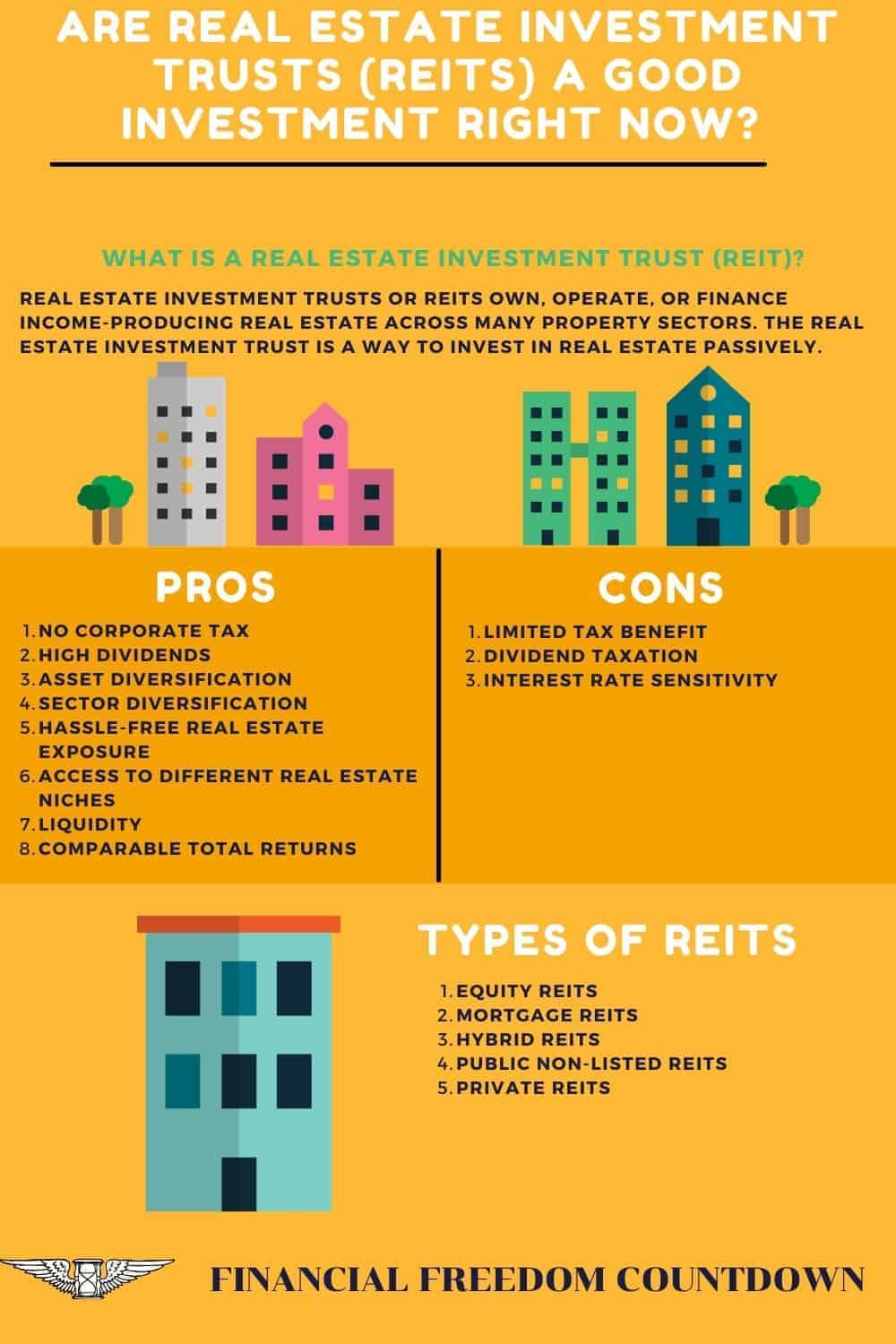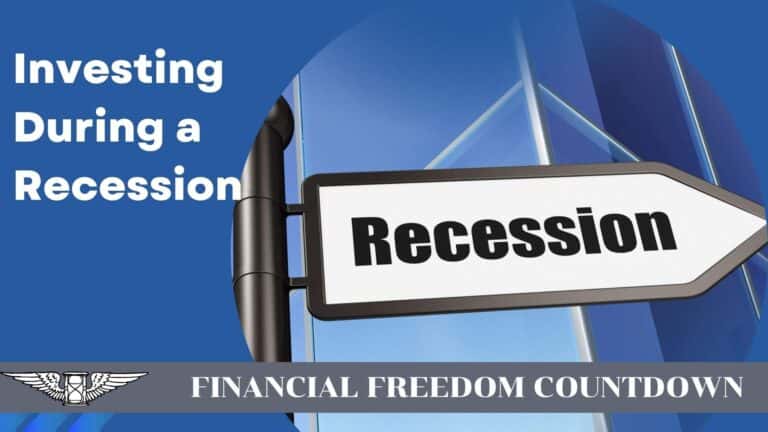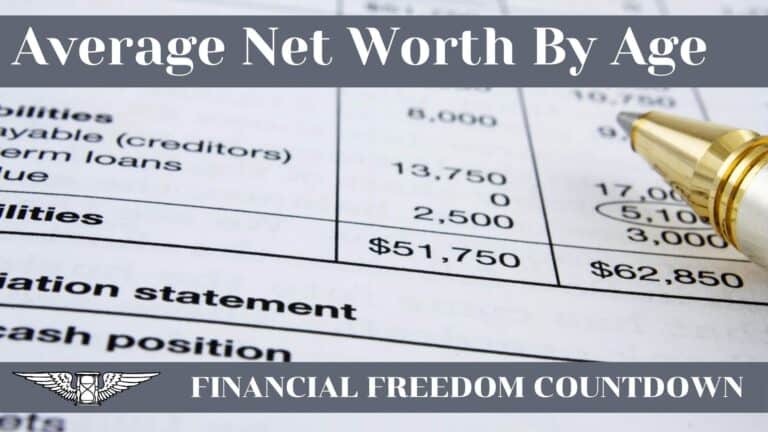Are Real Estate Investment Trusts (REITs) A Good Investment Right Now? The Pros And Cons

Although the Federal Reserve is not worried about inflation, housing prices all over the country are through the roof. There is no denying that the appetite for real estate investing is at all-time highs due to a combination of demographics, Central Bank policy, and major Wall Street firms stepping into the real estate markets.
There are various options to invest in real estate with little or no money as an individual investor.
Today we will deep-dive into Real Estate Investment Trusts and if REITs are a good investment now. Investing in REITs can be a great way to incorporate portfolio diversification. Before adding any asset class to your portfolio, it is better to examine your risk tolerance and weigh the pros and cons to determine if REITs are a good investment for your situation.
What Is A Real Estate Investment Trust (REIT)?
Real estate investment trusts or REITs own, operate, or finance income-producing real estate across many property sectors. The real estate investment trust is a way to invest in real estate passively.
REITs allow anyone to invest in real estate assets by purchasing individual company stock or through a mutual fund or exchange-traded fund (ETF). The stockholder of a REIT earns a share of the income produced without actually having to go out and buy, manage or sell the property.
Publicly-traded REITs are not the best substitute for real estate as we saw in our stocks vs. real estate duel
Types of REITs
Equity REITs
Equity REITs are the most prevalent type of REITs. Equity REITs own or operate income-producing real estates like shopping malls, commercial real estate, health care facilities, apartment buildings, warehouses, office buildings, cellphone towers, and hotels.
The publicly traded REITs are either index funds from the prominent fund families like Vanguard, Schwab, Fidelity, or certain niche REITs investing in only a real estate sector such as office space, self-storage, data centers, or malls.
Mortgage REITs
Mortgage REITs (mREITs) only provide financing for income-producing real estate by borrowing money at low short-term interest rates and purchase mortgages that pay more excellent long-term interest rates. The difference between the two rates is the Mortgage REIT’s profit. Mortgage REITs don’t own or operate real estate property.
Unlike traditional equity REITs, mREITs fluctuate wildly based on interest rates. Also, mortgage REITs are highly leveraged. The risk with mREITs is sudden changes in the Mortgage-backed securities (MBS) market, leading to massive losses or bankruptcy.
Hybrid REITs
A hybrid REIT is a real estate investment trust company that effectively combines equity and mortgage REITs (mREITs). They own and manage properties collecting rents, and also invest in mortgage securities. Hybrids REITs try to profit from rising and falling interest-rate environments by investing in actual properties and mortgages.
Public Non-listed REITs
Public non-listed REITs are registered with the SEC and are therefore regulated, but they are not traded on public exchanges. They operate like listed REITs nearly every other way. Still, since they do not sell publicly, investors need to purchase shares directly from the REIT’s management company through its real estate syndication platform or a third-party broker-dealer.
Also, public non-listed REITs are still required to make regular, periodic regulatory filings. Public non-listed REITs, however, are open to non-accredited investors.
Private REITs
Private REITs are exempt from SEC registration and whose shares do not trade on national stock exchanges. Private REITs have little liquidity, and hence it can be challenging if you need to sell immediately. They are typically only available to individuals meeting the accredited investor qualifications.
Streitwise which is available for accredited and non-accredited investors. is the most common example of a private non-traded REIT.
Advantages Of Investing In REITs
If you wonder why REITs are a good investment, REITs have some essential characteristics that make them unique. The pros of REIT investing are
No Corporate Tax
Based on IRS laws, a REIT needs to invest at least 75% of its assets in real estate and pay 90% of its taxable income as dividends. A company qualifying as a REIT then gets a tax break of ZERO corporate tax.
The absence of corporate tax is a considerable advantage compared to regular stocks.
Let us take Apple as an example which has had a great home run as part of my moonshot portfolio. Based on its annual profit, it pays corporate tax. Then it pays a dividend to its shareholders. When I receive the dividend, I pay taxes on it.
REITs avoid double taxation, which means more money in my pocket.
High Dividends
Since REITs are supposed to distribute 90% of their income as dividends, most REITs provide a higher dividend than other companies. Individuals wary of the 4% Safe Withdrawal Rate rule and the retirement calculators prefer the above-average REIT dividend yield to fund their lifestyle. The real estate passive income in the form of dividends can fund essential lifestyle expenses.
Asset Diversification
Part of a prudent asset allocation strategy is to be diversified into several asset classes. REITs provide an additional asset for diversification as compared to a vanilla stock-bond allocation.
Sector Diversification
Crowdfunded real estate requires at least $1,000 investment in a single property. To be sufficiently diversified, it is better to at least invest in 5 different properties. Depending on your net worth, it might not be possible to commit large amounts.
With REITs, you get the benefit of diversification across several properties for relatively smaller amounts. You can buy publicly-traded REITs using no-fee platforms like M1 Finance for as low as $10. Check out my M1 Finance review for more details on dollar-cost averaging your REIT purchases. The large fund families like Vanguard, Schwab, Fidelity all have Real estate index ETFs trading under the following ticker symbols – VNQ, SCHH, FREL, respectively.
Hassle-Free Real Estate Exposure
Another factor in favor of REITs is the real estate exposure combined with simplicity. REITs are a hassle-free way to have exposure to real estate. You don’t have to deal with tenants or toilets.
Of course, you lose some of the benefits of real estate, but for individuals looking for simplicity in exposure to this unique asset class, REITs fit the bill.
Access To Different Real Estate Niches
With a REIT, you can get specific and niche down to invest in only commercial office buildings or hospital REITs or hotel REITs or warehouse REITs or cell tower REITs or hospitality REITs or medical REITs. Or even REITs related to specific geographic areas such as Empire State Realty Trust, which owns the iconic Empire State building and other commercial real estates.
Liquidity
Since publicly traded REITs are traded like stocks, you have similar liquidity when investing in REITs. Real estate crowdfunding investments typically have a 3-5 year duration and are not considered liquid if you need to withdraw your funds at short notice.
Comparable Total Returns
Besides dividends, REITs have the potential for capital appreciation as the value of their underlying assets grows. Several REITs have generated total returns (dividends and price appreciation combined) that have kept pace with the stock market returns.
Drawbacks Of Investing In REITs
Now that we looked at the benefits of investing in REITs let us look at the cons of investing in REITs
Limited Tax Benefit
When you invest in real estate directly or through a Real Estate Syndication, you get many tax benefits such as depreciation, cost segregation, 1031 exchanges, opportunity zones credit, etc. It is harder to structure these benefits in public Equity REITs. While they claim depreciation on their own in order to reduce tax liability it doesn’t help in lowering your own tax bill. Private REITs and public non-traded REITs have the ability to claim and pass the tax benefits to you.
Dividend Taxation
As per the IRS rules, REIT dividends are taxed at the same rate as ordinary income. While REIT dividends benefit investors who prefer to use them to fund their lifestyle, you pay higher tax rates on dividends than capital gains tax rates.
As long as you are in a lower tax bracket, the taxation of dividends should not be an issue.
One method to avoid the taxation of dividends is to buy REITs in a tax-protected account such as a Roth or IRA when you are in a higher tax bracket. Once your tax bracket is lower in retirement, you can buy the REITs in a taxable account.
Interest Rate Sensitivity
Publicly traded REITs risk losing value as interest rates rise, which typically sends investment capital into bonds.
When interest rates are low, investors tolerate the real estate investment risks that come with REITs to obtain better returns. When interest rates rise, investors gravitate towards risk-free investments like Treasury securities. Given that we have been in a long-term declining interest rate trend for 40 years, I am not too worried about rising interest rates in the U.S.
Rising inflation could force the Fed to increase the interest rate. In such a scenario, you have to assess the impact on your REITs. For example, if inflation increases, my residential real estate REITs should technically increase rents and pass the additional money.
Dollar-cost averaging when investing in all asset classes, including REITs, is a great way to reduce the interest rate fluctuations.

Can You Lose Money In A REIT?
If you are wondering, “can I lose money in a REIT” the answer is YES! Only the U.S. Treasury is considered a safe asset.
Our ranking of the best passive income-producing assets indicates that the REITs have a middle-of-the-pack risk profile but correspondingly higher return.
Recession
Besides rising rate environments, REITs are not safe during a recession, depending on what kind of recession we encounter. REITs can lose money depending on what real estate is part of their portfolio and how the particular real estate sector performs.
For example, if you invest in REIT, which only holds mall and hotel properties, then you should be ready for a scenario where malls and travel are closed for an extended period. Similarly, if you invest in an office building REIT and everyone is forced to work from home, consider how that would impact your REIT performance.
On the other hand, with malls closed and everyone working from home, REITs focussed on warehouses did exceptionally well as the online economy boomed.
As always, it is best to be diversified when selecting REITs, so you have some real estate sectors always performing. One of the primary reasons I like Fundrise is that I can look at the investments within the REIT and decide accordingly. For example, Fundrise has income or growth eREIT. Similarly, they also have specific geographies such as an east Coast eRIET or Heartland eREIT where you know what you are investing in.
Interest Rates
Publicly traded REITs risk losing value as interest rates rise, which typically sends investment capital into bonds. The 10-year yield is a good indication of the interest rate sensitivity of REITs.
Is Owning A Home A Substitute For Investing In REITs?
The short answer is No.
Homeownership is not a substitute for investing in REITs or real estate, for that matter.
The home you live in is a consumption item and does not generate any income; unless you Airbnb a portion of it or rent rooms for house-hacking.
REITs represent an investment in commercial real estate, which generates continuing income flow from rents. Additionally, a REIT is a liquid investment diversified across various real estate properties in different geographic locations. By comparison, a house is a comparatively illiquid asset whose investment risk is not diversified but relatively highly concentrated.
Investment in real estate in the form of REITs or rental property should be separate from your primary home.
What Is the Best REIT To Invest In Right Now?
The best REIT stock to buy now is one that aligns with your investing goals, risk tolerance, and overall portfolio allocation.
It is hard to provide blanket guidance, so please consult with a licensed professional since your situation will differ.
At a high level, I can share my framework.
Before adding any REITs, I would look at my overall portfolio and figure out my asset allocation among the various asset classes. If I already have direct investments in real estate via rentals, I would focus on my existing rentals and consider expanding or diversifying. Of course, one might not want to deal with the hassles of tenants or toilets, and professional management might be a better option.
Since I live in the San Francisco Bay area and believe that owning a rental property is no longer a good investment, I would add some professionally managed real estate to the mix.
1) If I qualify as an accredited investor, I would evaluate deals on larger commercial platforms such as EquityMultiple (minimum $5,000) or CrowdStreet (minimum $25,000). The advantage of investing in crowdfunded real estate deals instead of public REITs is the tax advantages such as depreciation, 1031 exchanges, cost segregation, opportunity zones credit, etc. which will not be available in publicly-traded equity REITs. Also, rates for long-term capital gains are lower than short-term capital gains. The real estate syndicator can hold the property for over a year to qualify for a lower long-term capital gains rate.
2) If I qualify as an accredited investor and want to invest smaller amounts evaluating each property using a crowdfunding real estate checklist, I would consider PeerStreet, which has low minimums of $1,000. PeerStreet has both Debt and Equity deals. The Debt deals are similar to hard money lending, and I have invested in over 48 properties so far.
3) If I do not qualify as an accredited investor, then I would evaluate the various private REITs on Fundrise (minimum investment of $10) or DiversyFund (minimum investment $500).
4) If I do not want to evaluate any of the above options or want to invest much more smaller amounts, then I would go with a diversified index ETF from Vanguard (VNQ), Schwab (SCHH), Fidelity (FREL). One can buy publicly-traded REITs using no-fee platforms like M1 Finance for as low as $10. Check out my M1 Finance review for more details on dollar-cost averaging your REIT purchases.
Publicly traded REITs have the advantage of simplicity and liquidity. All the other options require some level of due diligence in evaluating the deal, but there is a possibility of higher returns and additional tax benefits. As with everything in life, there are trade-offs in each investment option.
Again, please consult with a licensed professional and do not consider anything I said as investment advice.
Final Thoughts, Are REITs A Good Investment?
Based on your investing goals, risk tolerance, and overall portfolio allocation, REITs could provide a great hassle-free way to gain exposure to real estate. They are one of the most popular investments for monthly income.
Weigh the pros and cons listed above to decide how much you want to invest in REITs.
Readers, do you have real estate exposure in your portfolio? Besides publicly traded real estate investment trusts, have you invested in any other options?
Are Real Estate Investment Trusts (REITs) A Good Investment Right Now is available in web story format.

John Dealbreuin came from a third world country to the US with only $1,000 not knowing anyone; guided by an immigrant dream. In 12 years, he achieved his retirement number.
He started Financial Freedom Countdown to help everyone think differently about their financial challenges and live their best lives. John resides in the San Francisco Bay Area enjoying nature trails and weight training.
Here are his recommended tools
Personal Capital: This is a free tool John uses to track his net worth on a regular basis and as a retirement planner. It also alerts him wrt hidden fees and has a budget tracker included.
Platforms like Yieldstreet provide investment options in art, legal, real estate, structured notes, venture capital, etc. They also have fixed-income portfolios spread across multiple asset classes with a single investment with low minimums of $10,000.







REITs can offer investors an opportunity to diversify their portfolio and gain exposure to the real estate market without direct property ownership. They often provide attractive dividends and potential for capital appreciation.
“Publicly traded REITs risk losing value as interest rates rise, which typically sends investment capital into bonds. ”
How is that different for private????
Liquidity of publicly traded REITs is a double-edged sword during times of market stress. Private REITs have a lock-in and don’t face redemption pressure as a result of panicked investors.
Saying “While they claim depreciation on their own in order to reduce tax liability it doesn’t help in lowering your own tax bill.”… is wrong. You would produce no incremental tax savings in a private reit. Implying otherwise is wrong.
The TCJA expanded the applicability of bonus depreciation and allows for 100% expensing of certain assets in the year of acquisition or renovation. A REIT can still take bonus depreciation to minimize the required distribution amount (hence the word limited). However, REIT investors are required to recognize taxable income in the year it was distributed.
For high income individuals, ability to time the pass through depreciation matters a lot. You can do a non-dividend distribution. A non-dividend distribution is often advantageous because it is not immediately taxable. Paying taxes later is almost always desirable because that capital can be invested to generate returns elsewhere instead of being paid to the IRS today.
Also there are limitation on REITs ability to utilize net operating loss.
Can you share you experience evaluating private and non-publicly traded deals and how it compares to publicly traded REITs?